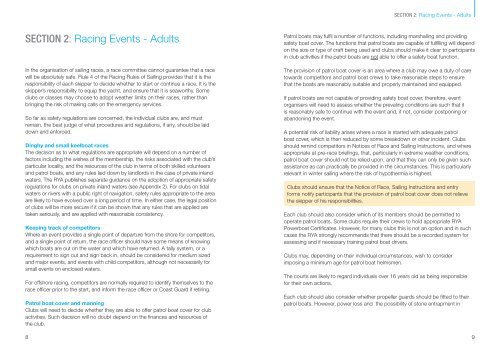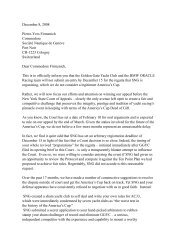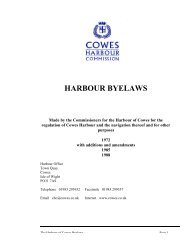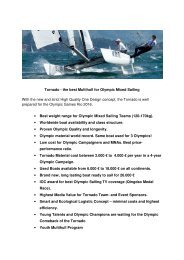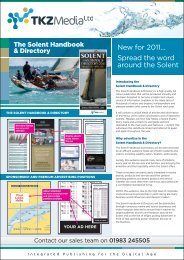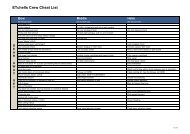The legal aspects of race, training and event management - rya
The legal aspects of race, training and event management - rya
The legal aspects of race, training and event management - rya
Create successful ePaper yourself
Turn your PDF publications into a flip-book with our unique Google optimized e-Paper software.
SECTION 2: Racing Events - AdultsSECTION 2: Racing Events - AdultsIn the organisation <strong>of</strong> sailing <strong>race</strong>s, a <strong>race</strong> committee cannot guarantee that a <strong>race</strong>will be absolutely safe. Rule 4 <strong>of</strong> the Racing Rules <strong>of</strong> Sailing provides that it is theresponsibility <strong>of</strong> each skipper to decide whether to start or continue a <strong>race</strong>. It is theskipper’s responsibility to equip the yacht, <strong>and</strong> ensure that it is seaworthy. Someclubs or classes may choose to adopt weather limits on their <strong>race</strong>s, rather thanbringing the risk <strong>of</strong> making calls on the emergency services.So far as safety regulations are concerned, the individual clubs are, <strong>and</strong> mustremain, the best judge <strong>of</strong> what procedures <strong>and</strong> regulations, if any, should be laiddown <strong>and</strong> enforced.Dinghy <strong>and</strong> small keelboat <strong>race</strong>s<strong>The</strong> decision as to what regulations are appropriate will depend on a number <strong>of</strong>factors including the wishes <strong>of</strong> the membership, the risks associated with the club’sparticular locality, <strong>and</strong> the resources <strong>of</strong> the club in terms <strong>of</strong> both skilled volunteers<strong>and</strong> patrol boats, <strong>and</strong> any rules laid down by l<strong>and</strong>lords in the case <strong>of</strong> private inl<strong>and</strong>waters. <strong>The</strong> RYA publishes separate guidance on the adoption <strong>of</strong> appropriate safetyregulations for clubs on private inl<strong>and</strong> waters (see Appendix 2). For clubs on tidalwaters or rivers with a public right <strong>of</strong> navigation, safety rules appropriate to the areaare likely to have evolved over a long period <strong>of</strong> time. In either case, the <strong>legal</strong> position<strong>of</strong> clubs will be more secure if it can be shown that any rules that are applied aretaken seriously, <strong>and</strong> are applied with reasonable consistency.Keeping track <strong>of</strong> competitorsWhere an <strong>event</strong> provides a single point <strong>of</strong> departure from the shore for competitors,<strong>and</strong> a single point <strong>of</strong> return, the <strong>race</strong> <strong>of</strong>fi cer should have some means <strong>of</strong> knowingwhich boats are out on the water <strong>and</strong> which have returned. A tally system, or arequirement to sign out <strong>and</strong> sign back in, should be considered for medium sized<strong>and</strong> major <strong>event</strong>s, <strong>and</strong> <strong>event</strong>s with child competitors, although not necessarily forsmall <strong>event</strong>s on enclosed waters.For <strong>of</strong>fshore racing, competitors are normally required to identify themselves to the<strong>race</strong> <strong>of</strong>fi cer prior to the start, <strong>and</strong> inform the <strong>race</strong> <strong>of</strong>fi cer or Coast Guard if retiring.Patrol boat cover <strong>and</strong> manningClubs will need to decide whether they are able to <strong>of</strong>fer patrol boat cover for clubactivities. Such decision will no doubt depend on the fi nances <strong>and</strong> resources <strong>of</strong>the club.Patrol boats may fulfi l a number <strong>of</strong> functions, including marshalling <strong>and</strong> providingsafety boat cover. <strong>The</strong> functions that patrol boats are capable <strong>of</strong> fulfi lling will dependon the size or type <strong>of</strong> craft being used <strong>and</strong> clubs should make it clear to participantsin club activities if the patrol boats are not able to <strong>of</strong>fer a safety boat function.<strong>The</strong> provision <strong>of</strong> patrol boat cover is an area where a club may owe a duty <strong>of</strong> caretowards competitors <strong>and</strong> patrol boat crews to take reasonable steps to ensurethat the boats are reasonably suitable <strong>and</strong> properly maintained <strong>and</strong> equipped.If patrol boats are not capable <strong>of</strong> providing safety boat cover, therefore, <strong>event</strong>organisers will need to assess whether the prevaling conditions are such that itis reasonably safe to continue with the <strong>event</strong> <strong>and</strong>, if not, consider postponing orab<strong>and</strong>oning the <strong>event</strong>.A potential risk <strong>of</strong> liability arises where a <strong>race</strong> is started with adequate patrolboat cover, which is then reduced by some breakdown or other incident. Clubsshould remind competitors in Notices <strong>of</strong> Race <strong>and</strong> Sailing Instructions, <strong>and</strong> whereappropriate at pre-<strong>race</strong> briefi ngs, that, particularly in extreme weather conditions,patrol boat cover should not be relied upon, <strong>and</strong> that they can only be given suchassistance as can practically be provided in the circumstances. This is particularlyrelevant in winter sailing where the risk <strong>of</strong> hypothermia is highest.Clubs should ensure that the Notice <strong>of</strong> Race, Sailing Instructions <strong>and</strong> entryforms notify participants that the provision <strong>of</strong> patrol boat cover does not relievethe skipper <strong>of</strong> his responsibilities.Each club should also consider which <strong>of</strong> its members should be permitted tooperate patrol boats. Some clubs require their crews to hold appropriate RYAPowerboat Certifi cates. However, for many clubs this is not an option <strong>and</strong> in suchcases the RYA strongly recommends that there should be a recorded system forassessing <strong>and</strong> if necessary <strong>training</strong> patrol boat drivers.Clubs may, depending on their individual circumstances, wish to considerimposing a minimum age for patrol boat helmsmen.<strong>The</strong> courts are likely to regard individuals over 16 years old as being responsiblefor their own actions.Each club should also consider whether propeller guards should be fi tted to theirpatrol boats. However, power loss <strong>and</strong> the possibility <strong>of</strong> stone entrapment in8 9


